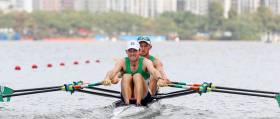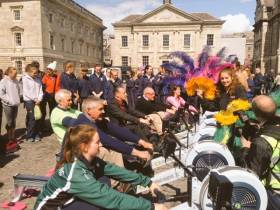Displaying items by tag: Sean Drea
Olympic Medallists Afloat Rowers of the Month
#Rowing: Paul and Gary O’Donovan are the Afloat Rowers of the Month for August. The brothers from West Cork achieved something no Irish crew had done before when they took a silver medal at the Olympic Games regatta in Rio de Janeiro in the lightweight double sculls. The O’Donovans had become European champions in Brandenburg in May. Paul ended the month of August by becoming world champion in the lightweight single sculls in Rotterdam - he was the only competitor who medalled at the Olympic Games and the World Championships.
At a tribute to the entire Ireland Olympic squad in UCD, the great Sean Drea, who finished fourth at the Olympic Games in Montreal in 1976, thanked the Ireland silver medallists. “On behalf of all the fourth-placed Olympians I would like to thank the O’Donovans for taking that monkey off our backs!” he said.
Rower of the Month awards: The judging panel is made up of Liam Gorman, rowing correspondent of The Irish Times, and David O'Brien, editor of Afloat magazine. Monthly awards for achievements during the year will appear on afloat.ie and the overall national award will be presented to the person or crew who, in the judges' opinion, achieved the most notable results in, or made the most significant contribution to rowing during 2016. Keep a monthly eye on progress and watch our 2016 champions list grow.
Drea Helps Young People Complete Road to Rio
#Rowing: The Road to Rio row came to a spirited conclusion in Parliament Square at Trinity College today. Ireland Olympians Sean Drea and Brendan Dolan and Eimear Lambe, younger sister of soon-to-be Olympian Claire, were among those taking part in the final push. Ministers Michael Noonan and Frances Fitzgerald visited the stand. Thousands of young people had done stints on ergometers, with the distances they covered counted off the 9195.97 kilometres from Ireland to Rio de Janeiro.






























































